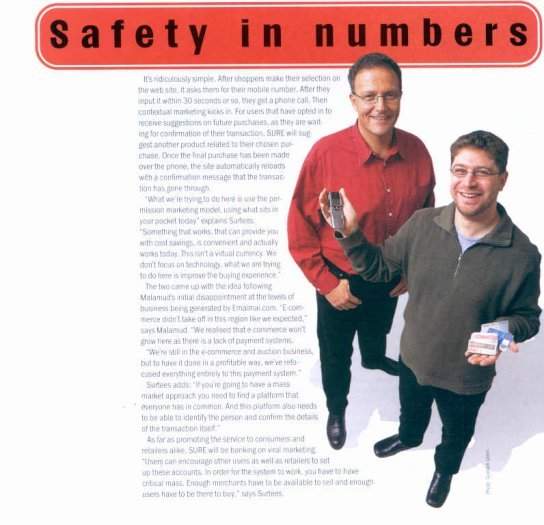Mobile users don't tend to have a problem giving out their numbers. So, as Tony Surtees and Moshe
Malamud of emaimai tell Rachel Oliver, why not let them pay for stuff with them too?
What do you get when you cross the ex-e-commerce head of Yahoo! with the international director of
a global collectables conglomerate and 100 million Chinese stamp collectors? Well, you get a
permission marketing-based mobile programme ot course, that allows you to pay for stuff on line
and off line without ever having to reach for your wallet. It might sound like a crazy combination,
but it is one that has resulted in emaimai (www.emaimai.com), the online auction site for
hard-to-find collectables, figuring that it has solved the problem Asian consumers have with putting
their credit card details online. Together Yahoo! veteran Tony Surtees and emaimai founder Moshe
Malamud have launched SURE (Secure User Remote Verification), a payment system which allows
retailers to sell online and off line to consumers without ever asking for their credit card
details. All they need is a mobile phone number.

It's ridiculously simple. After shoppers make their selection on the web site, it asks them for
their mobile number. After they input it within 30 seconds or so, they get a phone call. Then
contextual marketing kicks in. For users that have opted in to receive suggestions on future
purchases, as they are waiting for confirmation of their transaction, SURE will suggest another
product related to their chosen purchase. Once the final purchase has been made over the phone,
the site automatically reloads with a confirmation message that the transaction has gone through.
"What we're trying to do here is use the permission marketing model, using what sits in your
pocket today" explains Surtees. "Something that works, that can provide you with cost savings, is
convenient and actually works today. This isn't a virtual currency. We don't focus on technology,
what we are trying to do here is improve the buying experience."
The two came up with the idea following Malamud's initial disappointment at the levels of
business being generated by emaimai.com. "E-commerce didn't take off in this region like we
expected," says Malamud. "We realized that e-commerce won't grow here as there is a lack of
payment systems. "We're still in the e-commerce and auction business, but to have it done in
a profitable way, we've refocused everything entirely to this payment system.
Surtees adds: "If you're going to have a mass market approach you need to find a platform that
everyone has in common. And this platform also needs to be able to identify the person and confirm
the details of the transaction itself." As far as promoting the service to consumers and retailers
alike, SURE will be banking on viral marketing. Users can encourage other users as well as retailers
to set up these accounts. In order for the system to work, you have to have critical mass. Enough
merchants have to be available to sell and enough users have to be there to buy," says Surtees.




